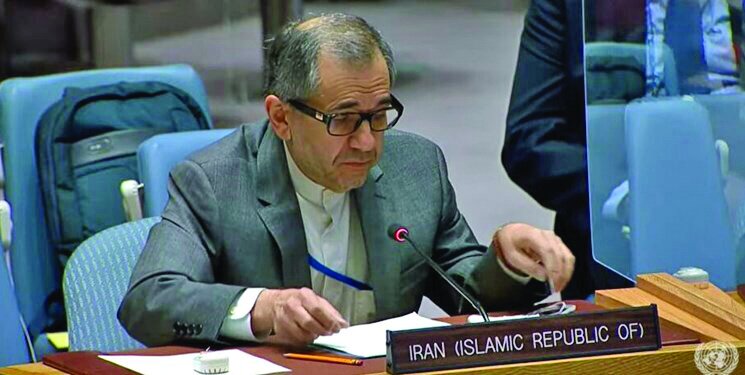Iran’s UN envoy: Unilateralism impedes development

TEHRAN- Majid Takht Ravanchi, the Iranian Ambassador and Permanent Representative to the United Nations, has stated that unilateralism by some global powers has hindered efforts for economic development in underdeveloped countries, irangov.ir reported on Friday.
Speaking at the 2022 ECOSOC Forum on Financing for Development in New York, which ran from April 25 to 28, Takht Ravanchi underscored that the international financial and trade system is experiencing more problems than ever before because of unilateralism.
Iran’s envoy underlined that the widespread attack on multilateralism has created new obstacles for both “international trade” and the “international financial system.”
“Unfortunately, while the international community reaffirms its commitment to strengthening multilateral cooperation, there are still a few countries that have opted for the failed path of unilateralism, even during such a dangerous and unprecedented situation,” Takht Ravanchi noted.
“It is undeniable that COVID-19 and unilateralism have substantially added to the financial difficulties and burdens of developing countries,” he added.
“On the one hand, developing countries must devote much of their scarce development resources to address the repercussions of the pandemic. On the other hand, some countries, including my own, also have to deal with the grave consequence of illegal UCMs (unilateral coercive measures) and unilateral sanctions imposed by those countries that claim to be the champions of human rights,” Iran’s top diplomat to the UN pointed out.
Takht Ravanchi went on to say that strengthening support for poor nations and enhancing access to various resources has never been more critical in helping them to not only recover better and faster, but also to help them achieve their long-term development goals.
“The embargo policies by some major players cast doubt on the effectiveness of multilateral financing and trading systems. The international community should therefore ensure that the trade and financial system, as well as financing for development in no way, become hostage to illegal unilateral agendas,” he added.
Every sovereign state has the right to participate in an inclusive and non-discriminatory multilateral economic system, according to the Iranian envoy.
“The World Trade Organization, where the Islamic Republic of Iran has been denied membership for more than two decades, is now a target of harsh unilateral behavior which puts the whole international trading system at risk,” he underscored.
Knowledge transfer and capacity building are among the top concerns for poor countries in achieving sustainable development, Takht Ravanchi said. Removing barriers to technology transfer is critical, he added.
“The international community should take all necessary measures to urge developed countries to lift artificial trade bans and remove restricted export measures on high-tech goods to developing countries,” he concluded.
Takht Ravanchi had previously stated in December that U.S. economic sanctions against his country and other countries obstruct the multilateralism required to combat the spread of coronavirus.
He asserted that the U.S. economic sanctions run contrary to the multilateralism needed to combat the coronavirus, and that the lack of strong international action to challenge such unlawful actions has left the subject of sustainable development “meaningless.”
“COVID-19 — as a wake-up call for the whole world — reminds us once again that the development, welfare and prosperity of all human beings are interconnected and interdependent. However, as the entire world continues to work together to contain the Covid-19, we witness that the U.S. continues to impose unilateral coercive measures, including illegal economic sanctions, on a number of countries including those that are greatly suffering from the grave consequences of the pandemic,” Iran’s UN envoy said.
“These illegal acts, on the one hand, and the lack of decisive action on the part of the international community to counter them, on the other, have turned the pivotal ideal of sustainable development, namely ‘no one should be left behind’, into a purely decorative and meaningless claim,” he regretted.
Takht Ravanchi emphasized that a global consensus is required for combating the COVID-19, saying, “International crises and challenges, such as the COVID-19 pandemic and unilateralism, cannot be defeated without a genuine collective response and joint efforts of all countries under the auspices of multilateralism, cooperation and solidarity and in conformity with the spirit of international collective coordination.”
Since the onset of the devastating coronavirus pandemic, there have been mounting calls inside and outside the U.S. for Washington to suspend its unilateral sanctions against other countries, which have thrown a kink in global attempts to contain the virus.
The United Nations, the European Union, and human rights organizations, as well as a number of American senators and politicians, have pressed the Biden administration to lift sanctions against Iran, Venezuela, Syria, Cuba, and North Korea, among others.
